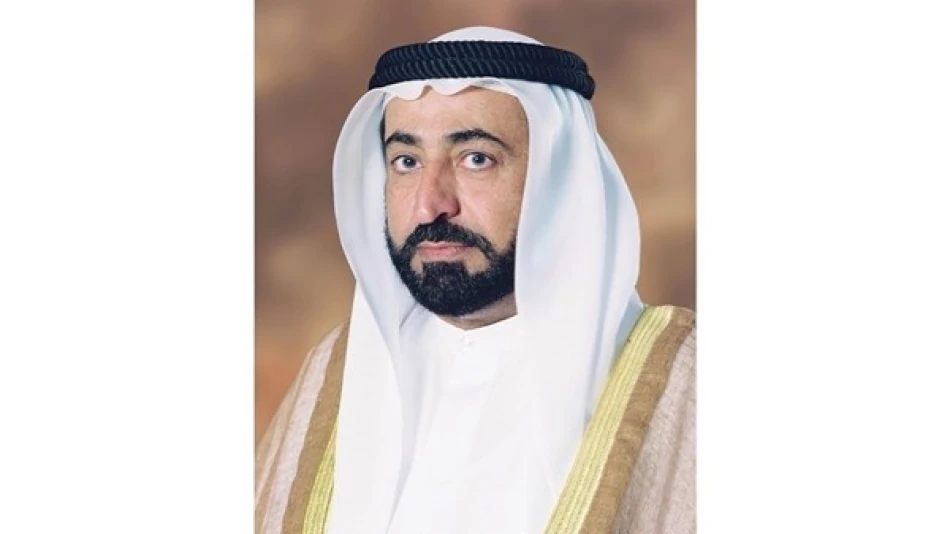
Sharjah Ruler Decrees Establishment of Sharjah Family Development Authority
Sharjah Launches Comprehensive Family Development Institution to Strengthen Social Cohesion
The Emirate of Sharjah has established a new government institution dedicated exclusively to family development and social stability, signaling the UAE's growing focus on addressing demographic challenges and social transformation in the Gulf region. The Sharjah Family Development Foundation, led by Sheikha Jawaher bint Mohammed Al Qasimi, represents a strategic shift toward institutionalizing family support as governments across the region grapple with changing social dynamics and economic diversification pressures.
Strategic Government Response to Social Change
His Highness Dr. Sheikh Sultan bin Mohammed Al Qasimi, Supreme Council Member and Ruler of Sharjah, issued the decree establishing the institution with broad legal authority and financial independence. The foundation will operate under the supervision of the Sharjah Council for Family and Community, with headquarters in Sharjah city and potential branches throughout the emirate.
This institutional approach reflects a growing recognition across the Gulf that rapid economic modernization requires parallel investment in social infrastructure. Unlike ad-hoc family support programs, Sharjah's model creates a permanent government entity with research capabilities, legislative influence, and strategic planning authority.
Comprehensive Mandate Beyond Traditional Social Services
Policy and Legislative Influence
The foundation's mandate extends far beyond traditional social services, encompassing policy development, legislative proposals, and strategic planning for family-related issues. This positions the institution as both a service provider and a policy think tank, capable of shaping long-term social legislation.
The foundation will conduct research on family challenges, propose solutions, and suggest legislative frameworks—functions typically reserved for government departments rather than semi-autonomous institutions. This structure allows for more agile responses to emerging social issues while maintaining government oversight.
Technology and Media Integration
Notably, the decree emphasizes leveraging advanced cultural and media tools for family and community awareness, recognizing that modern family support requires digital engagement strategies. This approach acknowledges how social media and technology have fundamentally altered family dynamics and communication patterns.
Regional Context and Demographic Pressures
Sharjah's initiative comes as Gulf states confront significant demographic shifts, including changing marriage patterns, evolving gender roles, and intergenerational cultural gaps. The UAE's expatriate-majority population creates additional complexity, as traditional family structures adapt to multicultural environments.
Similar family-focused initiatives have emerged across the region, but Sharjah's comprehensive institutional approach appears more ambitious than targeted programs in Saudi Arabia or Qatar. The emirate's emphasis on "social cohesion" and "family stability" suggests concerns about social fragmentation amid rapid economic change.
Economic Diversification Through Social Investment
This institutional investment aligns with broader UAE strategies to build knowledge-based economies that require stable, skilled populations. Strong family structures traditionally correlate with educational achievement, workforce stability, and social mobility—all critical for economic diversification beyond oil dependence.
The foundation's authority to form partnerships and international agreements indicates potential for exporting Sharjah's family development model, creating soft power influence while generating revenue streams through consulting and program development.
Implementation Challenges and Success Metrics
The foundation's success will likely depend on its ability to balance traditional values with modern realities, particularly regarding women's roles, youth expectations, and multicultural integration. The appointment of Sheikha Jawaher, known for her advocacy work, suggests emphasis on women's empowerment within family development frameworks.
Measuring impact will prove challenging, as family stability and social cohesion resist simple quantification. The foundation's research mandate suggests development of new social metrics and long-term tracking systems, potentially creating valuable data for other governments facing similar challenges.
The initiative represents a significant bet that institutional investment in family development can address broader social and economic challenges, positioning Sharjah as a regional leader in comprehensive social policy innovation.
Most Viewed News

 Layla Al Mansoori
Layla Al Mansoori






